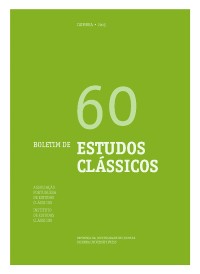Please use this identifier to cite or link to this item:
https://hdl.handle.net/10316.2/41487| Title: | Narcissus Circaeus ou o trágico em Il Compleanno de Marco Filiberti | Other Titles: | Narcissus Circaevs or the tragic in Il Compleanno by Marco Filiberti | Authors: | Rodrigues, Nuno Simões | Keywords: | Greek tragedy and cinema;Aristotle;poetics;tragic;Marco Filiberti;Tragédia grega e cinema;Aristóteles;poética;trágico;Marco Filiberti | Issue Date: | 2015 | Publisher: | Imprensa da Universidade de Coimbra | Abstract: | Matteo e Francesca e Shary e Diego constituem dois casais amigos, quarentões, que decidem passar um Verão juntos, numa casa de praia no sopé do Monte Circeu, em Itália. O segundo casal tem um filho, David, que está de regresso dos Estados Unidos, para celebrar o seu aniversário com a família. Quando chega, o jovem David depara com duas relações em crise, uma desgastada pelo afastamento dos cônjuges, a outra pela rotina do casal. Mas é a Matteo, o amigo dos pais de David, que cabe entrar num dilema interno que afecta a sua estabilidade emocional e que o atira para o domínio do tabu a vários níveis. Matteo sente-se profundamente atraído pelo jovem David, que, no entanto, parece oscilar entre a obsessão por si próprio e a atenção
que o homem mais velho lhe dedica. A Matteo resta decidir se cede à tentação ou se lhe resiste. O certo é que, cedendo à passio, haverá que lidar com as consequências da decisão que farão entrar todos os caracteres numa espiral de tragédia de contornos euripidianos e senequianos, em que não faltam muitos outros ecos da nossa herança clássica. São precisamente esses contornos que esta comunicação pretende analisar. Matteo & Francesca and Shay & Diego are two friend couples, in their forties, who decide to spend a summer together, in a beach house at the foot of Mount Circeo, in Italy. The second couple has a son, David, who has returned from the United States to celebrate his birthday with family. When he arrives, the young David faces two relationships in crisis: one worn by the physical separation of the spouses, the other by the routine of the couple. But it’s Matteo, David´s parents friend, who enters an internal dilemma that affects their emotional stability and that throws him into the domain of the taboo at various levels. Matteo feels deeply attracted by the young David, who, however, seems to oscillate between the obsession with himself and the attention that the older man dedicates to him. Matteo must decide whether he yields to temptation or resists it. The fact is that, yielding to the passio, he will have to deal with the consequences of his decision, which will cause all characters getting into a spiral of tragedy with euripidean and senequian features, in which there is no lack of many other echoes of our classical heritage. It is precisely these features that this paper aims to analyze. |
URI: | https://hdl.handle.net/10316.2/41487 | ISSN: | 0872-2110 2183-7260 (PDF) |
DOI: | 10.14195/0872-2110_60_14 | Rights: | open access |
| Appears in Collections: | Boletim de Estudos Clássicos |
Files in This Item:
| File | Description | Size | Format | |
|---|---|---|---|---|
| narcissus_circaevs.pdf | 265.97 kB | Adobe PDF |  |
Items in DSpace are protected by copyright, with all rights reserved, unless otherwise indicated.
